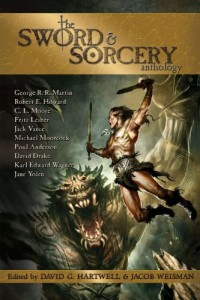Some may remember the name of the world from an RPG setting I’ve been working on last year, and which I used for a campaign this summer. With my interest in gamemastering significantly going back, I am now shifting towards trying my hand at writing stories. My current love in fiction is Sword & Sorcery, which conveniently focuses on a format of stories of shorter lengths and serial adventures instead of a single epic story arc, which personally suits me just fine. It seems much more practical for writing as a hobby instead of a profession. The more I looked into the craft of writing, the more it became apparent to me that worldbuilding for stories (be it book or movie) is very different from worldbuilding for a campaign. You can run campaigns in settings originally made for a book or movie, but that’s usually the most interesting for settings that have a lot of stories written for them. You probably wouldn’t run a campaign in the setting of Princess Mononoke, but Star Wars has everything a GM might ever want. In practice, a story setting, even an extremely detailed one, requires much less information on many things than a campaign setting. Even what Tolkien did was overkill, but writing The Lord of the Rings was really just the last thing he did with the world he had originally created just for the fun of creating a world. And in the end, 90% of all that material never gets even mentioned in the novel.
What I am planing to do here is to assemble a big toolbox of elements that I can use in stories and make references to, and also as a background that provides its own story hooks. I often find it a lot easier to come up with a story that involves the Sorcerer Kings of Dark Sun or the Priests of Set from Conans world, something that has to do with the Sith of Star Wars, or a plot dealing with the Daedra of The Elder Scrolls, than to come up with a story in a vacuum. I also find that it makes the stories feel more real. The plot does not just happen for a single reason and everything that is encountered or described in the story is in some way directly connected to the plot.
So what I am doing here with this series of articles is not about making an atlas and travel guide of the world, which enables a GM to pick locations a group of player characters can visit and how long it takes to travel between two points and what areas the journey would cross through. When you write a story, those are things you can just handwave. Maybe the journey took 10 days or 20, maybe they did have to cross a major river or mountain range, maybe not. In a game, those things are important. In a story you simply don’t mention what all happened between two scenes if it’s not relevant for the plot. Maps don’t matter. Instead, this is going to focus much more on the social and cultural side of worldbuilding. How do people from different population live and what is their relationship with each other. Where do they get there food from and what type of clothing do they wear. What technologies do they use in everyday life and what kinds of weapons and armor can they make or trade. These are all things that in most games really don’t matter or ever come up at all. In a story, they can be just as important as the plot, and in many cases have direct impact on the plot. And when a reader notices that there is a connection in a story between two things that have already been mentioned earlier, it makes the story feel a lot more realistic and unique. That’s why worldbuilding for books, movies, and videogames matters a lot. The Ancient Lands setting presented here is very heavily based on the Ancient Lands campaigns I ran in the past, but a lot of it has been shuffled around or been discarded completely, with a good deal of new elements being added to it, that make it a rather different world. Perhaps a bit like how the Forgotten Realms changed between the 3rd and 4th edition of D&D.
Continue reading “The Ancient Lands: A world of savage heroes and mythical beasts”



